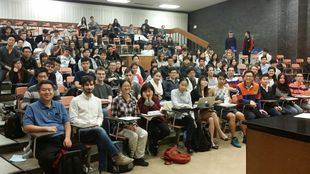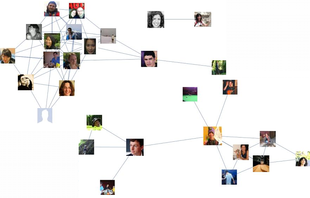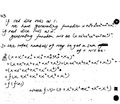15-344/Homework Assignment 9: Difference between revisions
(Created page with "{{15-344/Navigation}} {{In Preparation}} This assignment is due <span style="color: blue;">at the tutorials on Thursday December 3</span>. Here and everywhere, '''neatness cou...") |
Octopusheng (talk | contribs) No edit summary |
||
| (12 intermediate revisions by 3 users not shown) | |||
| Line 1: | Line 1: | ||
{{15-344/Navigation}} |
{{15-344/Navigation}} |
||
{{In Preparation}} |
|||
This assignment is due <span style="color: blue;">at the tutorials on Thursday December 3</span>. Here and everywhere, '''neatness counts!!''' You may be brilliant and you may mean just the right things, but if the teaching assistants will be having hard time deciphering your work they will give up and assume it is wrong. |
This assignment is due <span style="color: blue;">at the tutorials on Thursday December 3</span>. Here and everywhere, '''neatness counts!!''' You may be brilliant and you may mean just the right things, but if the teaching assistants will be having hard time deciphering your work they will give up and assume it is wrong. |
||
'''Reread''' sections 6.1-6.2 of our textbook, '''and''' your notes for November 26. Remember that reading math isn't like reading a novel! If you read a novel and miss a few details most likely you'll still understand the novel. But if you miss a few details in a math text, often you'll miss everything that follows. So reading math takes reading and rereading and rerereading and a lot of thought about what you've read. Also, '''preread''' chapter 7, just to get a feel for the future. |
'''Reread''' sections 6.1-6.2 of our textbook, '''and''' your notes for November 26 and December 1. Remember that reading math isn't like reading a novel! If you read a novel and miss a few details most likely you'll still understand the novel. But if you miss a few details in a math text, often you'll miss everything that follows. So reading math takes reading and rereading and rerereading and a lot of thought about what you've read. Also, '''preread''' chapter 7, just to get a feel for the future. |
||
'''Solve''' problems |
'''Solve''' problems 2abde, <u>2c</u>, 4abc, <u>4d</u>, 12, <u>16</u>, 20, and 25 in section 6.1 and problems 1, <u>2</u>, 11abcd, <u>11e</u>, 30, <u>32</u>, and <u>43</u> in section 6.2, but submit only your solutions of the underlined problems. |
||
'''In addition,''' solve the following problem. There is no need to submit your solution. |
|||
'''Part 1.''' For <math>n\geq 0</math>, let <math>C_n</math> be the <math>n</math>'th Catalan number, defined as the number of words made of <math>n</math> <math>a</math>'s and <math>n</math> <math>b</math>'s in which in every initial segment there are at least as many <math>a</math>'s as <math>b</math>'s. Prove that for <math>n\geq 1</math>, <math>C_n=C_0C_{n-1}+C_1C_{n-2}+C_2C_{n-3}+\ldots+C_{n-1}C_0</math>. |
|||
''Hint.'' If <math>w</math> is such a word, let <math>k\geq 1</math> be the smallest such that if you cut <math>w</math> after <math>2k</math> letters, then the number of <math>a</math>'s before the cut is equal to the number of <math>b</math>'s before the cut. What can you say about the part of <math>w</math> before the cut, and the part of <math>w</math> after the cut? |
|||
'''Part 2.''' For <math>n\geq 1</math>, let <math>D_n</math> be the number of different ways of computing the product <math>A_1A_2\cdots A_n</math> of <math>n</math> matrices. Prove that for <math>n\geq 2</math>, <math>D_n=D_1D_{n-1}+D_2D_{n-2}+D_3D_{n-3}+\ldots+D_{n-1}D_1</math>. |
|||
''Hint.'' In the last matrix multiplication to be carried out, you'd be multiplying the product of <math>k</math> of the matrices with the product of <math>n-k</math> of the matrices. |
|||
'''Part 3.''' Let <math>E_2=1</math> and for <math>n\geq 3</math> let <math>E_n</math> be the number of triangulations of a convex <math>n</math>-gon using non-crossing diagonals. Prove that for <math>n\geq 3</math>, <math>E_n=E_2E_{n-1}+E_3E_{n-2}+E_4E_{n-3}+\ldots+E_{n-1}E_2</math>. |
|||
''Hint.'' Choose one edge of the <math>n</math>-gon, and consider the triangle on top of it, what's to its left, and what's to its right. |
|||
'''Part 4.''' Use the above three assertions to prove that for any <math>n\geq 0</math>, <math>C_n=D_{n+1}=E_{n+2}</math>. |
|||
{{15-344:Dror/Students Divider}} |
{{15-344:Dror/Students Divider}} |
||
Homework Assignment 9 Solution |
|||
'''2) Build a generating function for <math>a_{r}</math>, the number of integer solutions to the following equations.''' |
|||
c) <math>e_{1}+e_{2}+e_{3}+e_{4} = r, 2\leq e_{i} \leq 7, e_{1}</math> even <math> e_{2} </math> odd. |
|||
'''A)''' For <math>e_{3}</math> and <math>e_{4}</math> together, we have <math>g_{1}(x) = (x^2+x^3+x^4+x^5+x^6+x^7)^2 </math> |
|||
For <math>e_{1}</math>, we have <math>g_{2}(x) = (x^2+x^4+x^6) </math> |
|||
For <math>e_{2}</math>, we have <math>g_{3}(x) = (x^3+x^5+x^7) </math> |
|||
In total, we have <math>g(x) = (x^2+x^4+x^6)(x^3+x^5+x^7)(x^2+x^3+x^4+x^5+x^6+x^7)^2 </math> |
|||
'''4 d) Three different boxes with at most five objects in the first box''' |
|||
'''A)''' <math>e_{1}+e_{2}+e_{3} = r</math> with <math>0\leq e_{1} \leq 5</math> |
|||
For <math>e_{1}</math>, we have <math> (1+x+x^2+x^3+x^4+x^5) </math> |
|||
Note that for the other two, we don't have a limit, so: |
|||
<math>\sum_{k=0}^{\infty}x^{k} = \frac{1}{1-x} </math> |
|||
so, in total we have: <math> g(x) = (1+x+x^2+x^3+x^4+x^5)(\frac{1}{1-x})^2 </math> |
|||
'''16) Find a generating function for the number of integers between 0 and 999,999 whose sum of digits is <math> r </math>.''' |
|||
'''A)''' For each integer in the range, we can express them as a six digit number, including 0's in the front (5 will be 000005). |
|||
So this amounts to finding: |
|||
<math> e_{1}+e_{2}+e_{3}+e_{4}+e_{5}+e_{6} = r , 0 \leq e_{i} \leq 9 , 1 \leq i \leq 6 </math> |
|||
So, we have <math> g(x) = (1+x+x^2+x^3+x^4+x^5+x^6+x^7+x^8+x^9)^6 </math> |
|||
'''Section 6.1 2) Find the coefficient of <math> x^r </math> in <math> (x^5 + x^6 + x^7 +...)^8</math>''' |
|||
'''A)''' |
|||
<math>(x^5 + x^6 + x^7 +...)^8 = (x^5(1+ x + x^2 ...))^8 = x^{40} \frac{1}{(1-x)^8} </math> |
|||
The coefficient of <math> x^r </math> in this will be of <math> x^{r-40} </math> in <math> (1-x)^{-8} </math>, which is |
|||
<math>\binom{(r-40) + 8 - 1}{r-40} </math> |
|||
== Scanned Solution to Homework9 P11e,32,43 in Secton6.2 == |
|||
<gallery> |
|||
15-344-HW9.1-Yunheng Chen.jpg|Page 1 |
|||
HW9.2-Yunheng Chen.jpg|Page 2 |
|||
</gallery> |
|||
Latest revision as of 00:58, 16 December 2015
This assignment is due at the tutorials on Thursday December 3. Here and everywhere, neatness counts!! You may be brilliant and you may mean just the right things, but if the teaching assistants will be having hard time deciphering your work they will give up and assume it is wrong.
Reread sections 6.1-6.2 of our textbook, and your notes for November 26 and December 1. Remember that reading math isn't like reading a novel! If you read a novel and miss a few details most likely you'll still understand the novel. But if you miss a few details in a math text, often you'll miss everything that follows. So reading math takes reading and rereading and rerereading and a lot of thought about what you've read. Also, preread chapter 7, just to get a feel for the future.
Solve problems 2abde, 2c, 4abc, 4d, 12, 16, 20, and 25 in section 6.1 and problems 1, 2, 11abcd, 11e, 30, 32, and 43 in section 6.2, but submit only your solutions of the underlined problems.
In addition, solve the following problem. There is no need to submit your solution.
Part 1. For [math]\displaystyle{ n\geq 0 }[/math], let [math]\displaystyle{ C_n }[/math] be the [math]\displaystyle{ n }[/math]'th Catalan number, defined as the number of words made of [math]\displaystyle{ n }[/math] [math]\displaystyle{ a }[/math]'s and [math]\displaystyle{ n }[/math] [math]\displaystyle{ b }[/math]'s in which in every initial segment there are at least as many [math]\displaystyle{ a }[/math]'s as [math]\displaystyle{ b }[/math]'s. Prove that for [math]\displaystyle{ n\geq 1 }[/math], [math]\displaystyle{ C_n=C_0C_{n-1}+C_1C_{n-2}+C_2C_{n-3}+\ldots+C_{n-1}C_0 }[/math].
Hint. If [math]\displaystyle{ w }[/math] is such a word, let [math]\displaystyle{ k\geq 1 }[/math] be the smallest such that if you cut [math]\displaystyle{ w }[/math] after [math]\displaystyle{ 2k }[/math] letters, then the number of [math]\displaystyle{ a }[/math]'s before the cut is equal to the number of [math]\displaystyle{ b }[/math]'s before the cut. What can you say about the part of [math]\displaystyle{ w }[/math] before the cut, and the part of [math]\displaystyle{ w }[/math] after the cut?
Part 2. For [math]\displaystyle{ n\geq 1 }[/math], let [math]\displaystyle{ D_n }[/math] be the number of different ways of computing the product [math]\displaystyle{ A_1A_2\cdots A_n }[/math] of [math]\displaystyle{ n }[/math] matrices. Prove that for [math]\displaystyle{ n\geq 2 }[/math], [math]\displaystyle{ D_n=D_1D_{n-1}+D_2D_{n-2}+D_3D_{n-3}+\ldots+D_{n-1}D_1 }[/math].
Hint. In the last matrix multiplication to be carried out, you'd be multiplying the product of [math]\displaystyle{ k }[/math] of the matrices with the product of [math]\displaystyle{ n-k }[/math] of the matrices.
Part 3. Let [math]\displaystyle{ E_2=1 }[/math] and for [math]\displaystyle{ n\geq 3 }[/math] let [math]\displaystyle{ E_n }[/math] be the number of triangulations of a convex [math]\displaystyle{ n }[/math]-gon using non-crossing diagonals. Prove that for [math]\displaystyle{ n\geq 3 }[/math], [math]\displaystyle{ E_n=E_2E_{n-1}+E_3E_{n-2}+E_4E_{n-3}+\ldots+E_{n-1}E_2 }[/math].
Hint. Choose one edge of the [math]\displaystyle{ n }[/math]-gon, and consider the triangle on top of it, what's to its left, and what's to its right.
Part 4. Use the above three assertions to prove that for any [math]\displaystyle{ n\geq 0 }[/math], [math]\displaystyle{ C_n=D_{n+1}=E_{n+2} }[/math].
| Dror's notes above / Students' notes below |
Homework Assignment 9 Solution
2) Build a generating function for [math]\displaystyle{ a_{r} }[/math], the number of integer solutions to the following equations.
c) [math]\displaystyle{ e_{1}+e_{2}+e_{3}+e_{4} = r, 2\leq e_{i} \leq 7, e_{1} }[/math] even [math]\displaystyle{ e_{2} }[/math] odd.
A) For [math]\displaystyle{ e_{3} }[/math] and [math]\displaystyle{ e_{4} }[/math] together, we have [math]\displaystyle{ g_{1}(x) = (x^2+x^3+x^4+x^5+x^6+x^7)^2 }[/math]
For [math]\displaystyle{ e_{1} }[/math], we have [math]\displaystyle{ g_{2}(x) = (x^2+x^4+x^6) }[/math]
For [math]\displaystyle{ e_{2} }[/math], we have [math]\displaystyle{ g_{3}(x) = (x^3+x^5+x^7) }[/math]
In total, we have [math]\displaystyle{ g(x) = (x^2+x^4+x^6)(x^3+x^5+x^7)(x^2+x^3+x^4+x^5+x^6+x^7)^2 }[/math]
4 d) Three different boxes with at most five objects in the first box
A) [math]\displaystyle{ e_{1}+e_{2}+e_{3} = r }[/math] with [math]\displaystyle{ 0\leq e_{1} \leq 5 }[/math]
For [math]\displaystyle{ e_{1} }[/math], we have [math]\displaystyle{ (1+x+x^2+x^3+x^4+x^5) }[/math]
Note that for the other two, we don't have a limit, so:
[math]\displaystyle{ \sum_{k=0}^{\infty}x^{k} = \frac{1}{1-x} }[/math]
so, in total we have: [math]\displaystyle{ g(x) = (1+x+x^2+x^3+x^4+x^5)(\frac{1}{1-x})^2 }[/math]
16) Find a generating function for the number of integers between 0 and 999,999 whose sum of digits is [math]\displaystyle{ r }[/math].
A) For each integer in the range, we can express them as a six digit number, including 0's in the front (5 will be 000005). So this amounts to finding:
[math]\displaystyle{ e_{1}+e_{2}+e_{3}+e_{4}+e_{5}+e_{6} = r , 0 \leq e_{i} \leq 9 , 1 \leq i \leq 6 }[/math]
So, we have [math]\displaystyle{ g(x) = (1+x+x^2+x^3+x^4+x^5+x^6+x^7+x^8+x^9)^6 }[/math]
Section 6.1 2) Find the coefficient of [math]\displaystyle{ x^r }[/math] in [math]\displaystyle{ (x^5 + x^6 + x^7 +...)^8 }[/math]
A)
[math]\displaystyle{ (x^5 + x^6 + x^7 +...)^8 = (x^5(1+ x + x^2 ...))^8 = x^{40} \frac{1}{(1-x)^8} }[/math]
The coefficient of [math]\displaystyle{ x^r }[/math] in this will be of [math]\displaystyle{ x^{r-40} }[/math] in [math]\displaystyle{ (1-x)^{-8} }[/math], which is
[math]\displaystyle{ \binom{(r-40) + 8 - 1}{r-40} }[/math]



